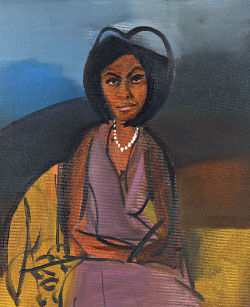
It is difficult for a European immigrant to the United States, such as myself, not to be taken aback by the fascination exerted by Michelle Obama on the republic. (I’m of the pre–Madame Sarkozy vintage.) A First Lady has no formal powers, and therefore the political relevance of Mrs. Obama extends, at most, to how, in her private dealings with her husband, she enables him to do his job. Whether she chooses to wear Tracy Feith or Isabel Toledo to breakfast, and whether at breakfast she gravitates toward the croissants or the bagels, are surely matters of indifference to us. But of course, they are not. We are gripped. Every little thing she does is or isn’t magic.
This, one quickly realizes, is more than another banal instance of pop-culture voyeurism. We’re concerned with the quasi-royalist strain in American politics, a strain that Americans are clearly aware of and have few problems with. Our acceptance is partly fatalistic—how can a First Lady, especially if she’s a beautiful and intelligent African-American, avoid an iconic fate?—and partly consequentialist: Where’s the harm in it? It’s this second premise that deserves scrutiny.

» The Meaning of an Icon» Her Body, Ourselves» Her Old-school Parenting» Her Father’s Daughter More Essays Why We Crave a Royal MichelleGood White House KeepingThe First Couple’s Sexual PoliticsFrom ‘Militant’ to ‘Princess’Extending the Obama BrandNormalizing the PresidentAbout FaceThe First Wives’ ClubLittle SisterThe Fashion QuestionThe Edible & PoliticalThat’s One Tall WomanWhy She Left Her Law FirmThe Suggestions in Her EyesMichelle: A LifeArtists’ Interpretations
It is surely clear that one of the worst features of the Bush administration was its unlawful extension of executive power; that this extension could not have occurred without our acquiescence; that our acquiescence was a phenomenon of mass deference; that this deference rested on some ancient human craving (yes, such cravings exist) to be mastered; and that this craving is antagonistic to the American republican ideal, namely that we are subject only to the mastery of the Constitution. Michelle Obama was elected by nobody into a role that is a legal nullity. We are certainly entitled to our moment of admiration, but there comes a point when to venerate our First Lady is to nourish a yearning to be ruled—which is to say, to affirm the murky prerogative exercised by our last president, with disastrous results.
The irony is that Mrs. Obama has shown no interest in the unofficial political power that we confer on accidental White House occupants. She is not Hillary Clinton. And Barack Obama, if he stands for anything, stands for rationality, legality, transparency; and opposes the notion that the president is ultimately loyal to an extra-constitutional set of fundamental values discernible only to him. That, at least, is cause for circumspect celebration.